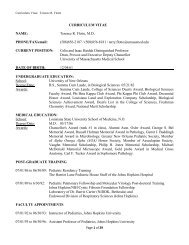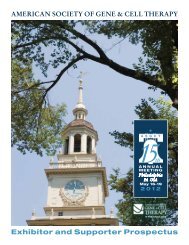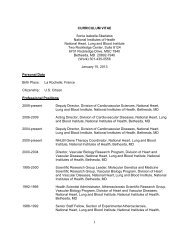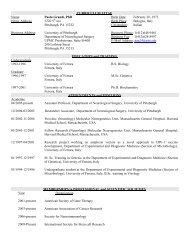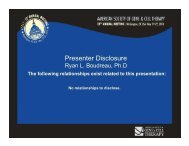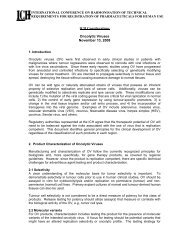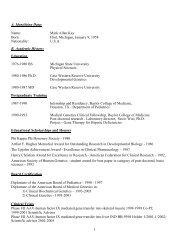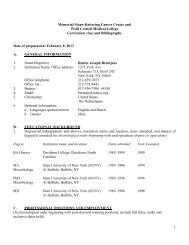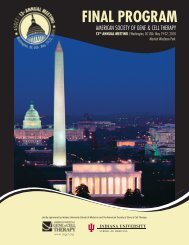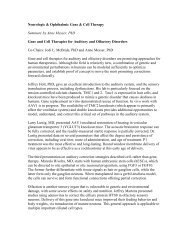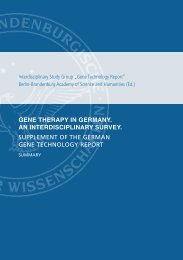Final Program - American Society of Gene & Cell Therapy
Final Program - American Society of Gene & Cell Therapy
Final Program - American Society of Gene & Cell Therapy
You also want an ePaper? Increase the reach of your titles
YUMPU automatically turns print PDFs into web optimized ePapers that Google loves.
<strong>Program</strong> Schedule, Thursday, May 16, 2013<br />
Carl H. June, MD<br />
T <strong>Cell</strong> Mediated <strong>Gene</strong> Transfer for Cancer <strong>Therapy</strong><br />
The adoptive transfer <strong>of</strong> anti-tumor T cells can mediate regression <strong>of</strong> established metastatic cancers in patients. We have begun a<br />
series <strong>of</strong> clinical trials using the transduction <strong>of</strong> genes encoding chimeric antigen receptors (CARs) or anti-tumor T cell receptors<br />
(TCR) into normal peripheral lymphocytes for use in adoptive cell transfer. Anti-tumor TCRs have been identiied that recognize<br />
cancer testis antigens. Autologous cells transduced with genes encoding the anti-NY-ESO-1 TCR cancer-testes antigen mediated<br />
objective clinical responses in patients with myeloma. An afinity enhanced MAGE A3 TCR caused severe adverse events with<br />
fatal <strong>of</strong>f-target cardiac toxicity, pointing to serious concerns with the ability <strong>of</strong> pre-clinical testing to identify <strong>of</strong>f target effects <strong>of</strong><br />
TCRs. Patients with acute pre-B cell leukemia or chronic lymphocytic leukemia exhibited a high objective regression rate using<br />
T cells transduced with a CD19 CAR. The cellular and molecular mechanisms <strong>of</strong> T cell destruction <strong>of</strong> cancers are under active<br />
investigation. Ongoing studies are evaluating chimeric antibody receptors targeting mesothelin, and EGFRvIII. Together these<br />
studies demonstrate the power and potential <strong>of</strong> adoptive T cell immunotherapy to mediate the regression <strong>of</strong> established advanced<br />
cancer in humans.<br />
Lieping Chen, MD, PhD<br />
New Perspectives in the Development <strong>of</strong> Cancer Vaccines<br />
There is ample evidence that human malignancies express tumor-associated or tumor-speciic antigens. Immunization with cancer<br />
antigen-based vaccine in animal models or patients with advanced cancer induce tumor-reactive T cells in lymphoid organs and<br />
these T cells can be detected in blood. However, increased circulating tumor-reactive T cells <strong>of</strong>ten do not correlate with regression<br />
<strong>of</strong> advanced cancer. Recent studies reveal that speciic resistant mechanisms are developed in the tumor microenvironment to<br />
suppress activity <strong>of</strong> tumor-iniltrating T cells. It is thus important to understand and identify molecules underlying these resistance<br />
mechanisms. I will focus my discussion on analysis <strong>of</strong> mechanisms in the tumor microenvironment in the context <strong>of</strong> improvement<br />
<strong>of</strong> the eficacy <strong>of</strong> cancer vaccines.<br />
Thursday, May 16, 2013<br />
<strong>Final</strong> <strong>Program</strong> SALT LAKE CITY, UTAH May 15–18, 2013<br />
55



